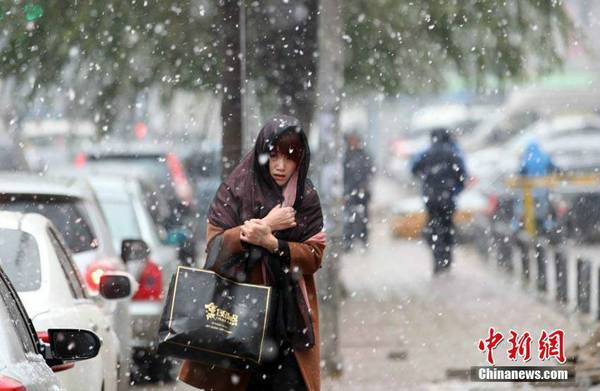

 |
In recent days, a sudden cold spell has swept across northern China, apparently signaling that winter has arrived early. Meteorological experts also predict that China will have a colder winter this year overall.
According to Ding Yihui, an academician with the Chinese Academy of Engineering and a special adviser to China Meteorological Administration, La Ni?a plays an important role in the early arrival of winter. Statistics from the National Climate Center show that the equatorial Eastern Central Pacific Ocean has been under the influence of La Ni?a since August. In China, winter temperatures are usually below average in years that are influenced by La Ni?a.
"Temperatures will likely be lower than average in northern China, especially in December. In southern China, the colder periods will be in January and February," explained Ding.
As a result of La Ni?a and chillier winter temperatures, Ding predicts that electricity and transport will be impacted because more energy will be consumed, and rain and ice will influence road conditions. The natural ecosystem, which is used to a warmer climate, will also be affected to some extent.
Zheng Fei, a researcher with the Institute of Atmospheric Physics under the Chinese Academy of Sciences, said that years under the influence of La Ni?a often see more frequent northern winds, which are conducive to the dispersal of air pollutants. Therefore, the silver lining of a colder winter could be reduced smog over the next few months.
 Fire brigade in Shanghai holds group wedding
Fire brigade in Shanghai holds group wedding Tourists enjoy ice sculptures in Datan Town, north China
Tourists enjoy ice sculptures in Datan Town, north China Sunset scenery of Dayan Pagoda in Xi'an
Sunset scenery of Dayan Pagoda in Xi'an Tourists have fun at scenic spot in Nanlong Town, NW China
Tourists have fun at scenic spot in Nanlong Town, NW China Harbin attracts tourists by making best use of ice in winter
Harbin attracts tourists by making best use of ice in winter In pics: FIS Alpine Ski Women's World Cup Slalom
In pics: FIS Alpine Ski Women's World Cup Slalom Black-necked cranes rest at reservoir in Lhunzhub County, Lhasa
Black-necked cranes rest at reservoir in Lhunzhub County, Lhasa China's FAST telescope will be available to foreign scientists in April
China's FAST telescope will be available to foreign scientists in April "She power" plays indispensable role in poverty alleviation
"She power" plays indispensable role in poverty alleviation Top 10 world news events of People's Daily in 2020
Top 10 world news events of People's Daily in 2020 Top 10 China news events of People's Daily in 2020
Top 10 China news events of People's Daily in 2020 Top 10 media buzzwords of 2020
Top 10 media buzzwords of 2020 Year-ender:10 major tourism stories of 2020
Year-ender:10 major tourism stories of 2020 No interference in Venezuelan issues
No interference in Venezuelan issues
 Biz prepares for trade spat
Biz prepares for trade spat
 Broadcasting Continent
Broadcasting Continent Australia wins Chinese CEOs as US loses
Australia wins Chinese CEOs as US loses